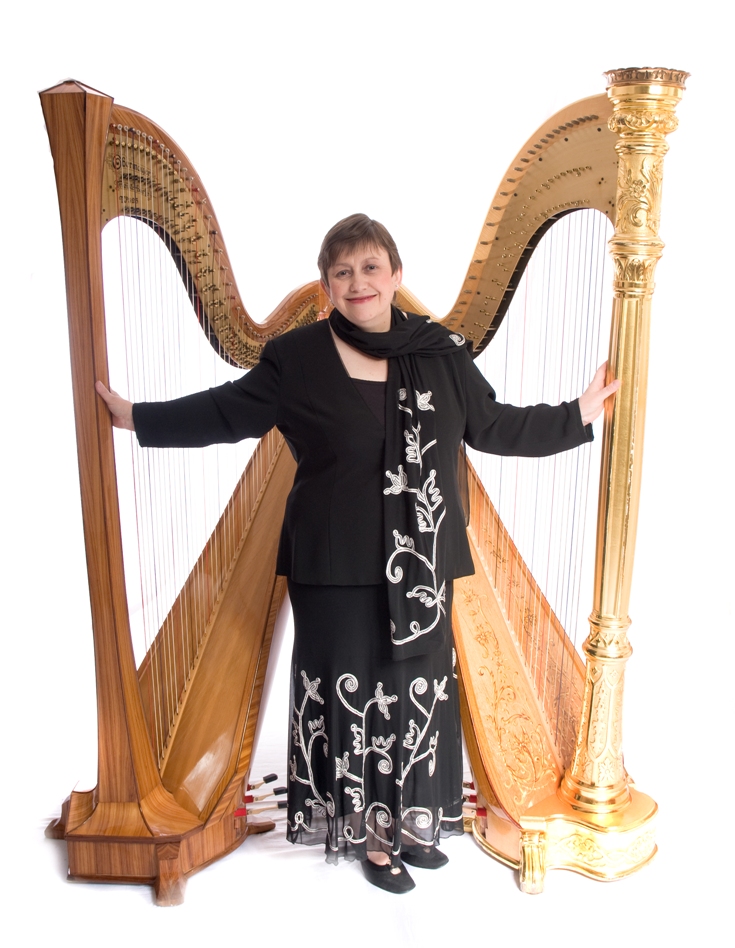What Anne-Sophie Mutter is to the violin, Alison Balsom to the trumpet and Sabine Meyer to the clarinet, so is Sioned Williams to the harp. Though Meyer had the glass-ceiling distinction of being the first woman in the Berlin Philharmonic, Williams’s service to the BBC Symphony Orchestra has been longer (nearly 25 years so far as principal harp). And while all four artists have had major new works composed for them, the harpist’s commission of six pieces to celebrate her 60th birthday would seem to be a record. And who else would have part-remortgaged her home to pay for the enrichment, an odd echo of her parents’ selling their semidetached house in Wales to buy her a Salvi harp back in 1972?
Fortunately the Park Lane Group, which enabled Williams to make her Purcell Room debut in 1977, stepped in at a relatively late stage to support her reappearance there 37 years later. They were rewarded with a packed, diverse and attentive audience full of distinguished friends and colleagues, and a transformation of this usually hard, cold space into an intimate, auditorium-lights-down focus on the harpist and the big screen above her so essential to the multimedia nature of two of the pieces.
The first two provided gratefully for what you’d expect of the harp – magical glissandi and eerie harmonics to the fore, not to mention one of the most magical word-effects for an instrument I know, bisbigliando or whispering. Paul Patterson’s homage to Williams’ obsession with the number six in her birthday year, Spirals, offered that in its second movement, before asking for a harp-and-tabor duet in the dancing “Humoresque”, Williams switching with effortless grace from the strings to rhythmic soundboard knockings. Anthony Bolton’s Impromptu harps on another supernatural ingredient, the octatonic scale “invented” by Rimsky-Korsakov, and brought in more at the spiky top and resonant bottom of the instrument.
 What that great entertainer Anna Russell would have called the “wispy” element couldn’t continue without monotony, though, and sure enough, we got a complete contrast in Dominic Murcott’s Domestica. The beautifully made film by Magali Charrier painstakingly edited by Murcott and described in the subtitle as “optional” could stand as an installation in its own right, jump-cutting between home sound effects that included magnified drip of water from tap to aluminium, spoon on teacup and gas ring firing to more still images like an old tree in the back garden through a sleet storm and the poetic swishing of blinds. A ticking clock sets the rhythm and the harp counterpoints, or dominates the effects, falling silent only when hands are seen in eloquent sign-language. It’s witty as well as haunting, a perfect jeu d’esprit for audiences of all ages.
What that great entertainer Anna Russell would have called the “wispy” element couldn’t continue without monotony, though, and sure enough, we got a complete contrast in Dominic Murcott’s Domestica. The beautifully made film by Magali Charrier painstakingly edited by Murcott and described in the subtitle as “optional” could stand as an installation in its own right, jump-cutting between home sound effects that included magnified drip of water from tap to aluminium, spoon on teacup and gas ring firing to more still images like an old tree in the back garden through a sleet storm and the poetic swishing of blinds. A ticking clock sets the rhythm and the harp counterpoints, or dominates the effects, falling silent only when hands are seen in eloquent sign-language. It’s witty as well as haunting, a perfect jeu d’esprit for audiences of all ages.
A deeper poetry dominated the second half, with Andy Scott’s mostly simpler five-movement homage to 1950s vinyl Jukebox as an intermezzo with a surprisingly complex finale. Michael Finnissy’s Welsh Harp allowed Williams to weave the magic of a foreground melody, touching on the Welsh tune for “Megan’s Daughter”, and draw it slowly into the quiet distance, the blue remembered hills, at which great harp-playing so excels. Michael Stimpson’s The Drowning of Capel Celyn refined the profundity down to two-part dialogues between the left and right hands and at the heart of the piece a single line as intimate as the sound of the Middle Eastern Oud.
Glissandi only briefly intrude to represent the inundation of the village in North Wales, which was flooded in 1965 to give way to a reservoir for Liverpool; we saw haunting black-and-white images before the piece began, accompanied by great Welshman and grandfather of the harpist Huw T Edwards’ poem Tryweryn read in English by Alexander Rider and in Welsh by Williams herself. The “Farewell” restores diatonic nostalgia after anxiety and grief, with another hint of a Welsh traditional song, only to bring back questions at the end, to be followed by a long silence: Wilfred Owen's "all a poet can do is warn" came to mind. Williams knows how to hold a mood before, during and after the sounds; that, as much as her modesty, enthusiasm, sound-palette and generosity as a teacher passing on the essential human values of music-making, marks her out as a truly great artist. Llongyfarchiadau, Sioned.
- Sioned Williams gives a lecture-recital at St Andrew's Fulham Fields on 20 November at 7.30pm
- David Nice's blog on Sioned Williams's City Lit lecture as part of his BBC Symphony Orchestra course
Next page: watch Sioned Williams in recent works by Graham Fitkin and Amir Konjani
Sioned Williams plays the MIDI harp in a new concerto by Graham Fitkin
Iranian composer Amir Konjani's Myself and the resistance of wine














Add comment